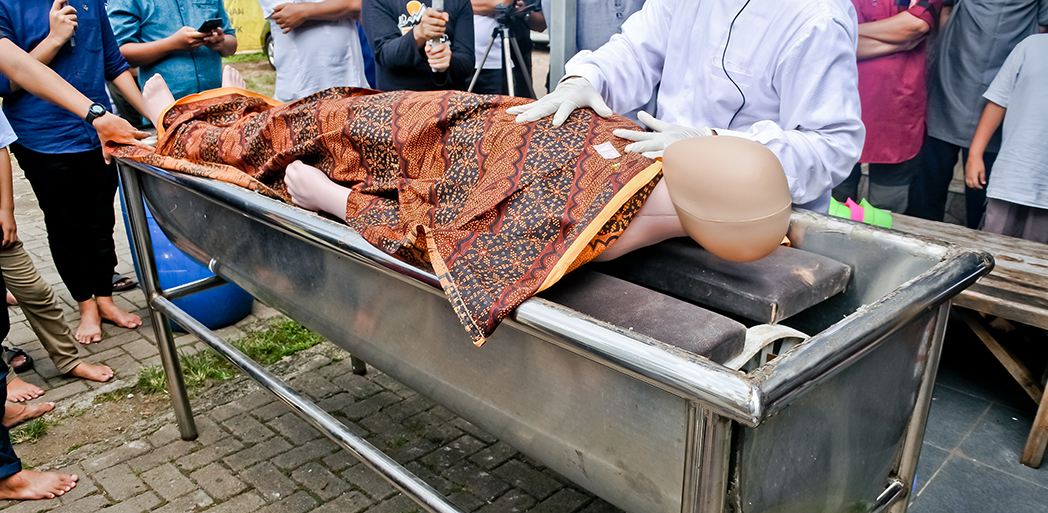Home > The Important Ritual of Ghusl, Islamic Ritual Washing
The Important Ritual of Ghusl, Islamic Ritual Washing
by Zeyneb Sayilgan, PhD, the Muslim scholar at Institute for Islamic, Christian, and Jewish Studies
In Islam, the ritual washing before burial, known as ghusl (غسل), is a very important and sacred practice that involves washing the deceased’s body in a specific manner. It is performed by a group of people by those who are of the same gender as the deceased.
Who Performs the Ritual Washing?
- Family members or close relatives. The deceased’s close family members, often the closest of kin (like a father, brother, or spouse), may be involved in performing the washing. In the case of a female deceased, female relatives such as a mother, sister, or wife may typically do the washing.
- Community members. If the family is unable or does not wish to perform the washing themselves, trusted members of the Muslim community, such as religious leaders or professionals trained in the washing, may be asked to carry out the ritual.

- Specialized funeral workers. In some communities, there are individuals who are professionally trained to wash and prepare the body for burial. These professionals are often knowledgeable in Islamic customs and the steps involved in performing the washing properly.
The Importance of the Ritual Washing
- Spiritual purity. In Islam, the washing of the body before burial is a symbol of purification and a way of showing respect for the deceased. The deceased is believed to have returned to God, and performing this ritual ensures that the body is cleansed of any impurities before the journey to the afterlife.
- Fulfilling religious duties. The practice of the ritual washing is a religious obligation for Muslims when preparing the body for burial. It is an essential step in the Islamic funeral rites, which also include the funeral prayer and the burial itself. It is seen as an act of kindness and an important way to honor the deceased. Muslim funeral services are typically open to everyone in the community. It is a communal obligation to attend the funeral service, which is publicly announced in the community so everyone can attend and show their last respects.
- Dignity and respect. By performing the ritual washing, the washers treat the deceased with dignity and respect. It is meant to be done with the utmost care and consideration. The body is usually washed three times (though it can be more or less depending on circumstances) with water and sometimes with fragrant substances, such as camphor, to cleanse and perfume the body. This ritual is seen as a final act of love and respect for the deceased.
- Symbolic of the cleansing from sin. In Islamic belief, the ritual washing also symbolizes the washing away of sins. It is believed that this purification prepares the deceased for their final journey and meeting with God.
- Following the prophet’s tradition. The act of washing the body is part of the sunnah, the teachings and practices of the Prophet Muhammad. It is considered an important tradition that Muslims strive to follow.
How Is the Ritual Washing Performed?
- The deceased is placed on a special table. The body is placed on a clean surface, usually a table specifically designed for the purpose of washing the deceased.
- Washing the body. The body is washed with lukewarm water that feels comfortable to the deceased; the spirit of the deceased is alive and observing the entire ritual. It is customary to first wash the private parts, perform the small ritual ablution, then wash the rest of the body. Water may be mixed with substances such as camphor or fragrant oils. The body is washed at least three times, though it can be more or less depending on need.
- Covering the body. While washing, the deceased is usually covered for modesty, with only the necessary parts of the body exposed. It is prohibited to gaze at and expose the deceased ’s body unnecessarily or to reveal aspects of their body to others. This is to maintain the honor, dignity, and worth of every human being.
- Shrouding. After the washing, the body is dried and then wrapped in a simple white shroud (kafan). This shroud symbolizes equality, as it is the same for everyone, regardless of their wealth or status during their lifetime. Women are covered in five pieces, including a white headscarf. Men are covered in three pieces of white shroud. The kafan is typically made from plain white cloth. No adornments or decorations are allowed on the kafan, as it symbolizes the return to God, where worldly status and material possessions are left behind.
The entire process is conducted with great care and reverence, as it is not just a physical act but also a deeply spiritual one. The community gathers in prayer and support, recognizing the transition the deceased is about to make from this world to the next.
To learn more about Zeyneb Sayilgan, PhD and the work of ICJS visit their site.
